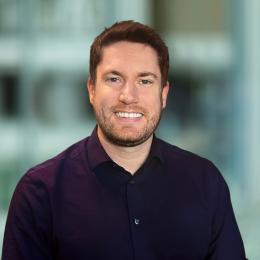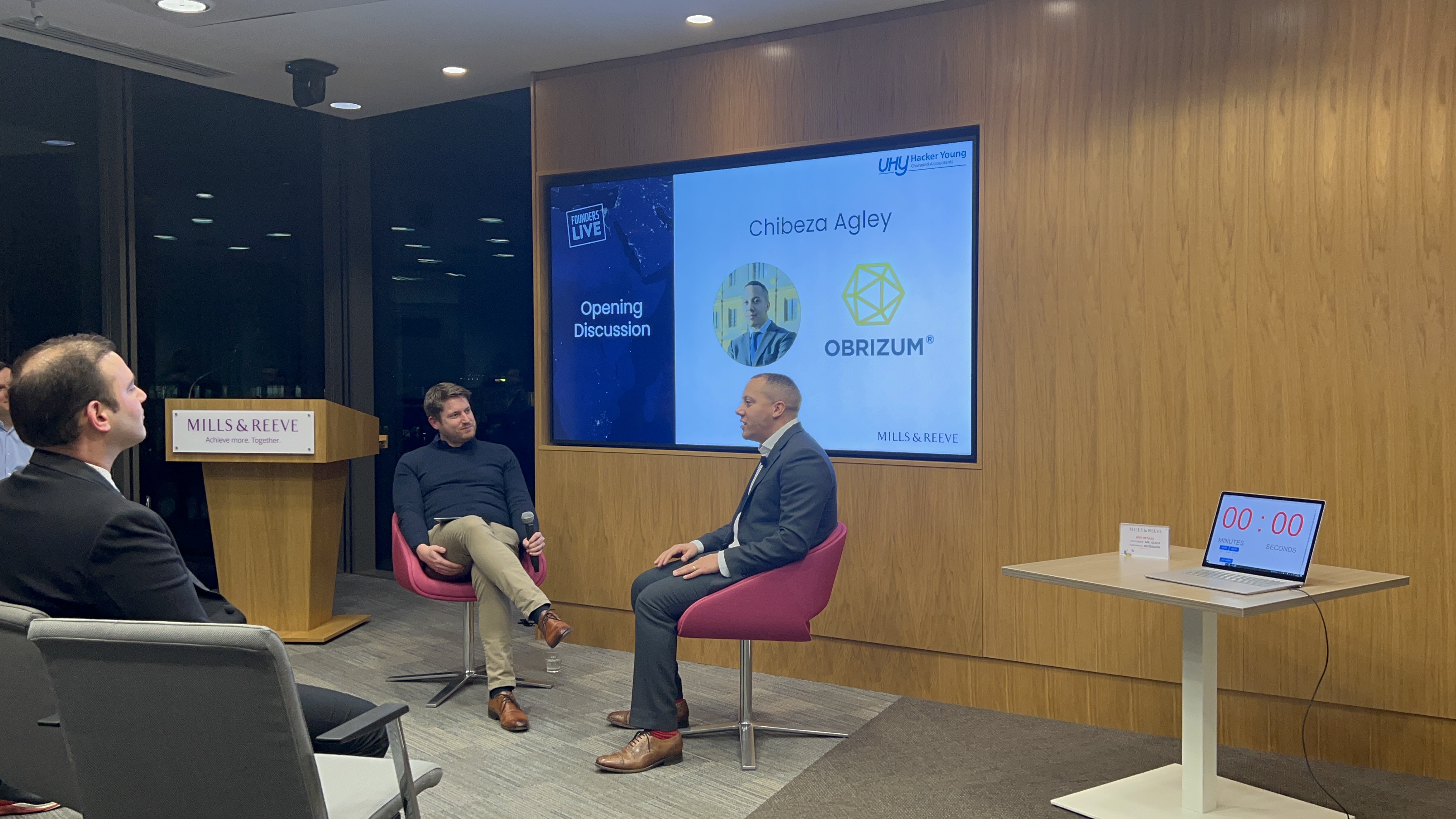On 25th April, we’ll be hosting our third Founders Live as part of UK Tech Week, which involves 5 early-stage founders pitching their businesses in only 99 seconds before a four-minute live audience Q&A. Like our fireside chat with Jack Waley-Cohen at our first event, we’ll also be interviewing a founder before we get started with the pitches.
So I thought now would be a great time to reflect on the fireside chat at our last event, where I had the pleasure of interviewing Chibeza Agley, CEO and co-founder of Obrizum Group. Here are the best parts of that fireside chat:
Firstly, could you introduce yourself and, for those who don’t know, explain a little bit about what Obrizum does?
I’m the CEO and one of the three co-founders of Obrizum Group. I founded the company roughly 8.5 years ago in Cambridge. Obrizum is an AI-first company. We started working with AI many years ago before this more recent wave where it has become super cool again.
We’re solving the challenge of working with complex and large organisations that don’t have a handle on all the information that they use to train their people. We do this by feeding the information across an organisation into our platform which then analyses and builds programmes of training automatically. We can work in any sector and with any subject at any level and our AI will build programmes of training, learning or assessment with minimal human oversight.
Today, we work with some of the largest organisations in the world, including central government in the aerospace and defence sector, on some really exciting projects to deliver on the promise of personalised projects.
Going back to when we met each other 7-8 years ago, the business was called CamBioScience and you were all working at Cambridge University, could you share how the idea came about?
In Cambridge, we were working at the very cutting edge of science, seeing progress in amazing and exciting fields such as gene editing and stem cell technology. We knew that these technologies would change the world, but the general public and businesses didn’t yet know how to grasp and wield these technologies to turn them into exciting businesses. So, we started trying to close this gap by curating this information from the people that did know how to use it and then physically taking the information to people that could also be able to us it. Those people found it really valuable and as such, we were making money right out of the gate, but we quickly realised it wasn’t very scalable. We knew what we were trying to scale was something very human, so the only way to get this to work was by using artificial intelligence to look to do what a human could do, but at scale. As you mention, it was called CamBioScience at the time because we were focusing on the life sciences and healthcare sector, but we soon realised that there were the same kind of challenges that we were solving, like information overload, the need for personalisation and better qualify of analytics, wasn’t something that was limited to life science and healthcare, it was everywhere, it was a ubiquitous problem.
Then we thought we’ve got something that could be a billion-dollar company, so let’s spread our wings and go for it, and that’s what we’ve been doing ever since.
So there was a bit of a pivot in terms of focusing not just life sciences but towards any type of business, would you say over the years the founders' original vision has changed in other ways as well?
When I look back, it’s remarkable how close the business is today to the vision that we had initially. We’ve stayed true to the initial idea of being able to automatically produce personalised programmes of training and to curate them without the need for a lot of human oversight. Of course, along our journey, we’ve had new challenges and approached new markets, such as a shift from being predominantly B2C to working in enterprise, but overall our aims have remained consistent.
How have you grown in your role as CEO over the last 8 years?
It’s been a very steep and constant learning curve, every day and week. My role in the business is as CEO, so I get to do a lot of what others would consider the worst tasks, such as fundraising, sales and everything in between. However, you learn to appreciate the challenges and the big issues that come along the way. Whilst these issues and challenges will initially be very problematic for you, you’ll then learn and grow from the experiences and it makes you better at your job.
What would you say is one of the most important early hires?
They weren’t technically my hires, as I didn’t have any money to offer them salaries at the time, but I made the choice very early on to have co-founders rather than go for it alone and that was a good decision for me. My co-founders, Dr Juergen Fink and Dr Sarra Achouri, were definitely the best people that I could have possibly asked to go on this journey with me.
After that, it was our wonderful engineers, we initially only had two: a front-end engineer and a back-end engineer, who are still with the company today and watching them grow and develop incredible technology has been delightful.
The biggest topic of this event is fundraising, looking at your business to date which has raised nearly £15m. Could you share a little bit about the journey and your outlook on the process?
Fundraising is a massive responsibility for founders and it’s one of the hardest. Commonly, the two hardest tasks in the early years are selling and fundraising, both can be brutal, but fundraising is particularly so, so it becomes a crucial skill for the CEO and founding team. We’ve been through the initial rounds of raising angel/seed money which is an interesting experience, because at that point, you have no credibility but you’ve got to convince people to give material sums of money to you to get things off the ground. At this stage where you may not have something tangible to show, you need to hone your skills or persuasion and build a really good business case which encourages someone to make that investment.
You also quickly learn that it’s a game of statistics, so you really do need to ask quite a lot of people! Some outliers quickly raise very large sums, but those are the outliers and in general, there is a lot of grind that goes into fundraising and you need to learn about that and keep going.
How important has it been, in your experience, to do reverse due diligence to make sure you have the right investors on board?
Finding the right investors who are genuinely supportive will make all the difference because it can be a really hard journey, so those investors are golden and you should look after them. However, in the early years, you may not always be able to pick. The key rule for any company is don’t run out of money so sometimes you need to do the deal, so you choose when you can but otherwise, you need to be ready to do the deal.
As you start to prove yourself, you can start to be more selective and as soon as you can start to be more selective, do so and wield that power carefully as it can have a gigantic influence on your future and the health of the business.
How did you decide to fundraise as opposed to bootstrapping?
We’ve raised a fair amount of money over time but you can try and go it alone without the money to try and build the business, or you can do the deal and get diluted and if your company makes it, you’ll still do very well.
If you can bootstrap to a great revenue without getting diluted, then great, do it. However, other times it makes sense to fundraise to get money in to build the business and then get it back at the next stage when your valuation goes up. I did the math on this and wasn’t afraid of the dilution from doing the deal and so far, it’s proved like it was the right decision. The company has gone through the fundraising rounds and we’ve now got a great company with a team of very smart people.
What is the common thread between you that has kept you and the co-founders working well together?
We’re very different which is interesting. I’m the character that will go and do the sales, investment meetings and events. Our other co-founder, Juergen, is very diligent, great with numbers and extremely hard-working. Then we’ve got Sarra, a communicative, creative, problem-solver. The point is we’re all different characters with diverse backgrounds and interests. However, the common thread is the mutual respect that we have for each other and our ability to cooperate. When something goes wrong, nobody loses their temper – that’s never happened to us. You might have a stiff conversation now and again, but that’s it. There’s a mutual respect for each other’s intelligence and capability and that’s what’s best to go through those really brutal times as a group so I would say that is one of the main reasons that we are still here.
Our next Founders Live:
On 25th April, we’ll be hosting our third Founders Live in Cambridge as part of UK Tech Week. We’ll again have another interesting fireside chat, as well as five founders pitching their companies to the audience. If you would like to come along, please sign up via this link.
If you’re interested in pitching at this or a future event, please contact David Hailey on d.hailey@uhy-uk.com.



